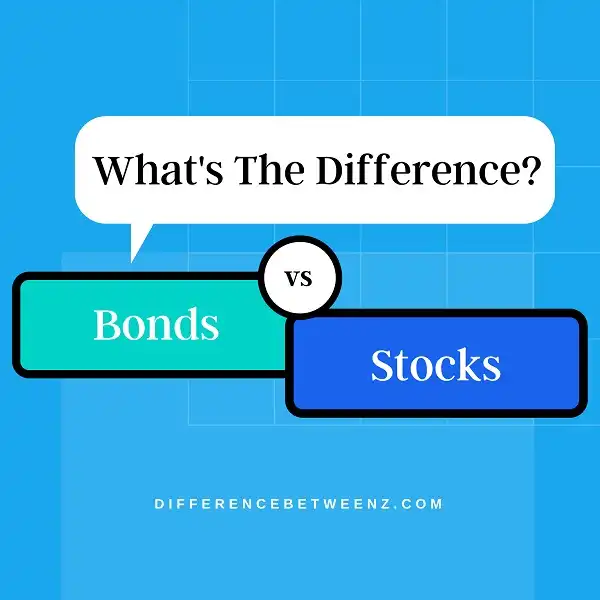Are you wondering what the difference between stocks and bonds is? Both are important investments, but they have different functions. Stocks represent a share of ownership in a company, while bonds are loans that companies and governments issue to raise money. When you buy stocks, you become a part of the company, and when you buy bonds, you are lending money to the company or government. The return on stocks comes from the appreciation of the stock’s price over time, while the return on bonds comes from the interest payments made by the issuer. Some people prefer to invest in just one or the other, but others diversify their portfolios by investing in both stocks and bonds.
What are Bonds?
A bond is a debt investment in which an investor loans money to an entity (typically corporate or governmental) that borrows the funds for a defined period of time at a fixed interest rate. Bonds are used by companies, municipalities, states, and sovereign governments to raise money and finance a variety of projects and activities. Investors in bonds receive periodic interest payments, called coupons, from the issuer. In return for loaning the issuer money, the investor expects to receive his or her principal back when the bond matures. The term “maturity” refers to the length of time until the principal amount of the bond is due to be repaid.
What are Stocks?
When you hear the word “stock,” you might think of a physical object, like lumber or cattle. In the financial world, stocks are a little different. They represent ownership in a company, and they can be bought and sold on the stock market. When you buy stock in a company, you become a shareholder. This means that you own a small part of the company and are entitled to a share of its profits (or losses). The value of a stock is constantly changing, and it is affected by factors such as the company’s financial stability, the overall performance of the stock market, and global events. As a result, stocks can be risky investments, but they also have the potential to generate significant returns.
Difference between Bonds and Stocks
Bonds and stocks are two of the most common types of investments. Both offer potential financial rewards, but they work in different ways. Bonds are essentially loans that investors make to governments or corporations. The borrower agrees to pay interest on the loan and to repay the principal amount when the bond matures. Stocks, on the other hand, represent ownership shares in a company. When a company earns profits, stockholders may receive a portion of those profits in the form of dividends. In addition, stocks may increase in value over time, allowing investors to sell them for a profit. Because they involve different risks and rewards, bonds and stocks can be used to diversify a portfolio and help manage risk.
Conclusion
In conclusion, there are a few key differences between bonds and stocks. Bonds are debt instruments that offer fixed payments, while stocks are equity investments in businesses that offer ownership shares and the opportunity for capital gains. When making an investment decision, it’s important to understand the different risks and rewards associated with each type of security.


